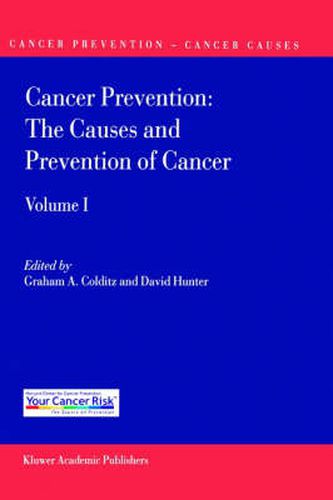Readings Newsletter
Become a Readings Member to make your shopping experience even easier.
Sign in or sign up for free!
You’re not far away from qualifying for FREE standard shipping within Australia
You’ve qualified for FREE standard shipping within Australia
The cart is loading…






This Cancer Prevention book series aims to complement the research reported in the journal Cancer Causes and Control. Volumes in this series will summarize the state of the science from causes to prevention of cancer. The scope will be international. The past 20 years has seen an explosion of epidemiologic material on the causes of cancer. Examples include the growing number of studies of physical activity and colon cancer which have emerged and the numerous studies of components of diet such as alcohol and the risk of specific cancers. Major shifts in resource allocation now focus on translation of this new knowledge to actual cancer prevention programs. Researchers, practicing clinicians, and those who write and implement public health policy need this information summarized in an easily accessible format. The abundance of knowledge, increasing understanding of how to communicate risk of cancer to the public, and greater public awareness of cancer, make the coming years ones in which we will see many new attempts at widespread cancer prevention programs. For example, the U.S. Centers for Disease Control and Prevention launched a national colon cancer awareness campaign in early 1999.
$9.00 standard shipping within Australia
FREE standard shipping within Australia for orders over $100.00
Express & International shipping calculated at checkout
This Cancer Prevention book series aims to complement the research reported in the journal Cancer Causes and Control. Volumes in this series will summarize the state of the science from causes to prevention of cancer. The scope will be international. The past 20 years has seen an explosion of epidemiologic material on the causes of cancer. Examples include the growing number of studies of physical activity and colon cancer which have emerged and the numerous studies of components of diet such as alcohol and the risk of specific cancers. Major shifts in resource allocation now focus on translation of this new knowledge to actual cancer prevention programs. Researchers, practicing clinicians, and those who write and implement public health policy need this information summarized in an easily accessible format. The abundance of knowledge, increasing understanding of how to communicate risk of cancer to the public, and greater public awareness of cancer, make the coming years ones in which we will see many new attempts at widespread cancer prevention programs. For example, the U.S. Centers for Disease Control and Prevention launched a national colon cancer awareness campaign in early 1999.